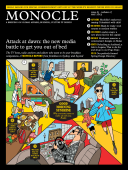
Issue 63
Attack at dawn: the new media battle to get you out of bed. The TV hosts, radio anchors and editors who want to be your breakfast companions. A Monocle report from frontlines in Sydney and beyond.
In This Issue
Oops! No content was found.
Looks like we no longer have content for the page you're on. Perhaps try a search?
Return Home

